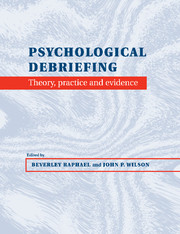Book contents
- Frontmatter
- Contents
- List of contributors
- Introduction and overview: Key issues in the conceptualization of debriefing
- Part I Key conceptual framework of debriefing
- 1 Stress management and debriefing: historical concepts and present patterns
- 2 Debriefing: its role in the spectrum of prevention and acute management of psychological trauma
- 3 Briefing and debriefing: group psychological interventions in acute stressor situations
- 4 Theoretical perspectives of traumatic stress and debriefings
- Part II Debriefing: models, research and practice
- Part III Adaptations of debriefing models
- Part IV Debriefing overview and future directions
- Conclusion: debriefing – science, belief and wisdom
- Index
2 - Debriefing: its role in the spectrum of prevention and acute management of psychological trauma
from Part I - Key conceptual framework of debriefing
Published online by Cambridge University Press: 06 January 2010
- Frontmatter
- Contents
- List of contributors
- Introduction and overview: Key issues in the conceptualization of debriefing
- Part I Key conceptual framework of debriefing
- 1 Stress management and debriefing: historical concepts and present patterns
- 2 Debriefing: its role in the spectrum of prevention and acute management of psychological trauma
- 3 Briefing and debriefing: group psychological interventions in acute stressor situations
- 4 Theoretical perspectives of traumatic stress and debriefings
- Part II Debriefing: models, research and practice
- Part III Adaptations of debriefing models
- Part IV Debriefing overview and future directions
- Conclusion: debriefing – science, belief and wisdom
- Index
Summary
EDITORIAL COMMENTS
This chapter explores two important parameters relevant to debriefing: who attends debriefing when this is a voluntary procedure (as itusually is); and does ‘natural debriefing’ through ‘talking’ have a beneficial effect? The former concept is important, for if debriefing is to be useful it should reach those in greatest need. The groups' research found that those with greatest exposure, with past disaster experience, and with good social support were more likely to seek debriefing after disaster exposure, and women more so. Those who do not attend may be at risk through lack of support networks and because they have had potentially no ‘mitigating’ effect of prior experience.
In a separate study the authors examined ‘natural talking’ after a disaster and attempted to evaluate whether or not this made a difference. They found that high levels of talking response with social networks were associated with high exposure and high education and high post-traumatic stress disorder (PTSD) symptoms. However, at the follow-up assessment seven months after the disaster, there was no indication that this talking had led to a decrease in symptomatology and levels of PTSD and depressive symptoms, which were found to be related to high levels of exposure as assessed earlier.
Ursano and his group conclude that these findings indicate ‘several cautions for the real-world application of formal debriefing’. These include the need to identify potential high-risk groups and that further studies are needed to explore the ‘talk’ aspect of debriefing in both formal and natural circumstances.
Keywords
- Type
- Chapter
- Information
- Psychological DebriefingTheory, Practice and Evidence, pp. 32 - 42Publisher: Cambridge University PressPrint publication year: 2000
- 8
- Cited by



